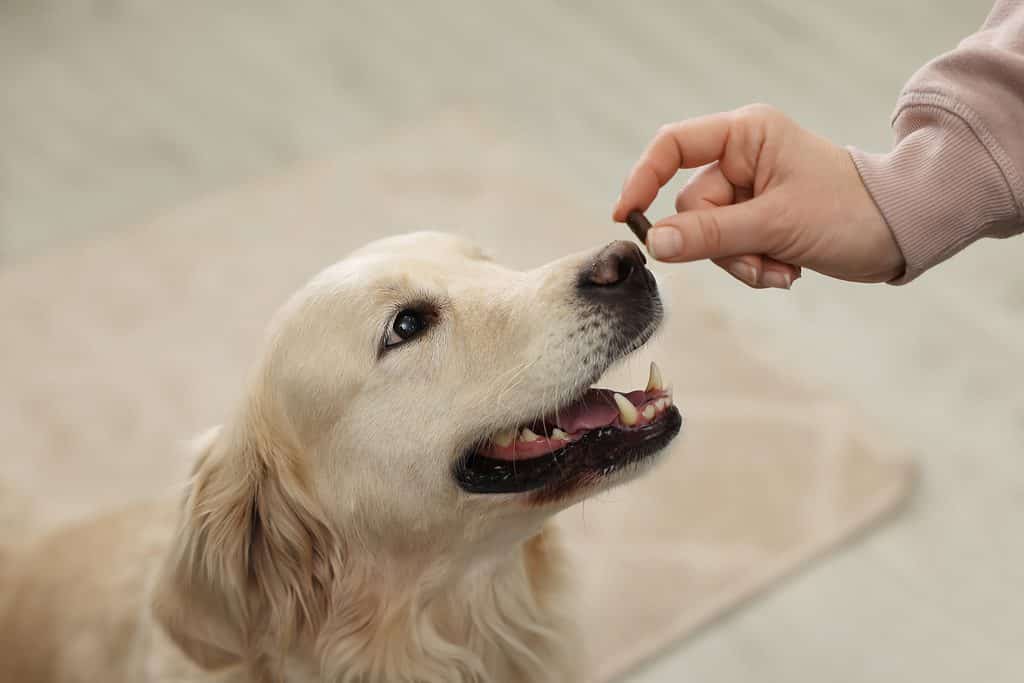Melatonin is a hormone that’s naturally present in human and dog bodies. It can also be taken as a supplement, usually to help humans fall or stay asleep.
Melatonin may help as a sedative for dogs who have anxiety disorders, and is also sometimes used to treat hair loss or alopecia in dogs. It’s safe for dogs so long as you follow the dosage prescribed by your veterinarian, but you should never feed your dog melatonin without speaking to your vet first.
If your dog gets into large amounts of melatonin, this is dangerous due to the risk of overdose. Some human melatonin products contain xylitol, which is highly toxic to dogs. Call a veterinarian or pet poison hotline immediately if your dog consumes melatonin unintentionally.
In this article, we’ll talk about whether dogs can eat melatonin, its uses, and its potential side effects or dangers.

Melatonin may help as a sedative for dogs who have anxiety disorders, and is also sometimes used to treat hair loss or alopecia in dogs.
©New Africa/Shutterstock.com
Is Melatonin Safe for Dogs?
Melatonin can be safe and even beneficial for dogs so long as it’s given at the advice of your veterinarian. You should not give your dog melatonin before speaking to a veterinary professional, as there is a risk of overdose or adverse side effects.
Human melatonin may contain added ingredients that are unsafe for dogs, such as the sweetener xylitol which is toxic.
It’s also important to keep in mind that melatonin for dogs is not approved by the FDA, and we don’t have comprehensive studies into its benefits or risks.
This means that melatonin marketed at dogs is unregulated. There are also side effects to melatonin, as there are to everything. Your veterinarian should tell you what to look for while giving your dog melatonin, and we’ll also discuss its side effects below.
That said, the ASPCA lists melatonin as a safe sleep aid for dogs, and many veterinarians agree that it’s generally quite safe.

Melatonin can be safe and even beneficial for dogs so long as it’s given at the advice of your veterinarian.
©SeventyFour/Shutterstock.com
Can You Give Your Dog Melatonin Every Day?
Melatonin can be given to dogs every day or as needed to help with anxiety, hair loss, or trouble sleeping. But before you give your dog melatonin at all, you must speak to your veterinarian.
They’ll be able to tell you what dosage of melatonin is safe for your dog and how often you should give it.
How Much Melatonin Can I Give my Dog?
The amount of melatonin your dog is prescribed will depend on their size, health, and what the melatonin is being used for. These are all factors your veterinarian will consider before recommending the right dosage.
Benefits of Melatonin for Dogs
Melatonin can help with various medical problems, including:
- Anxiety. From dogs who are intensely afraid of fireworks to those with separation anxiety, melatonin can calm them down and lessen their anxiety symptoms.
- Alopecia. Melatonin has been shown to sometimes help dogs who are losing their fur, allowing it to grow back healthily.
- Dementia. Dogs with dementia who are having difficulty sleeping or abnormal sleep schedules are sometimes given melatonin to get back on track. This can help ebb the confusion caused by a pup being awake at abnormal times, which throws off their expected routine.
- Blindness. Blind dogs may become confused about when to sleep, because they can’t tell the difference between day and night visually. Melatonin at night can help to resolve this and get their body used to sleeping at night again.
- Difficulty sleeping. Like humans, dogs who have trouble sleeping can take melatonin before bedtime to get more restful sleep.

Dogs with dementia who are having difficulty sleeping or abnormal sleep schedules may benefit from melatonin.
©NayaDadara/Shutterstock.com
Side Effects of Melatonin for Dogs
Side effects don’t appear to be common, but we also don’t have a lot of studies into the safety of melatonin for dogs. According to the American Kennel Club, the following might occur when your dog takes melatonin:
- Fertility changes
- Stomach problems
- Increased heart rate
- Itchiness
- Confusion
The ASPCA also notes lethargy as a possible side effect.
What To Do If Your Dog Eats Too Much Melatonin
First, check the melatonin your dog ate for xylitol (also known as birch sugar or wood sugar). Some human supplements contain this sweetener, which is highly toxic to dogs.
Next, call a veterinarian or pet poison hotline. If your primary veterinarian is too busy to immediately take your dog, or is currently closed, call an emergency clinic instead.
Tell them approximately how much melatonin your dog ate, whether it contained xylitol, and whether they’re currently showing symptoms of overdose or poisoning.
Symptoms of melatonin overdose include:
- Lethargy
- Stomach upset
- Vomiting
Symptoms of xylitol poisoning include:
- Vomiting
- Lowered blood sugar (tiredness, incoordination, collapse, seizures)
- Coma
- Hypoglycemia
- Liver failure
Especially if the product contains xylitol, I don’t recommend waiting before contacting a professional. They can help determine if your dog needs to be seen.
If it’s soon enough after your dog has eaten melatonin containing xylitol, they might recommend inducing vomiting at a vet clinic. Don’t try this at home unless instructed by a professional, as it can often do more harm than good.
Up Next
- How Much Sleep Does A Dog Need? (By Age, Size, And More)
- Why Do Dogs Sleep on Their Backs? You May Be Surprised
- Choosing The Best Dog Foods: Everything You Need To Know
The photo featured at the top of this post is © Aleksey Boyko/Shutterstock.com
Ready to discover the top 10 cutest dog breeds in the entire world?
How about the fastest dogs, the largest dogs and those that are -- quite frankly -- just the kindest dogs on the planet? Each day, AZ Animals sends out lists just like this to our thousands of email subscribers. And the best part? It's FREE. Join today by entering your email below.
Sources
- ASPCA, Available here: https://www.aspca.org/news/rest-easy-getting-facts-pet-safety-and-sleep-aids
- Natchez Trace Veterinary Services, Available here: https://franklintnvet.com/melatonin-therapy-for-canine-alopecia/
- American Kennel Club, Available here: https://www.akc.org/expert-advice/health/melatonin-for-dogs-uses-benefits-and-dosage/
- FDA, Available here: https://www.fda.gov/consumers/consumer-updates/paws-xylitol-its-dangerous-dogs
- ASPCA, Available here: https://www.aspca.org/news/keep-calm-what-do-if-your-pet-gets-calming-aids-or-treats
Thank you for reading! Have some feedback for us? Contact the AZ Animals editorial team.






